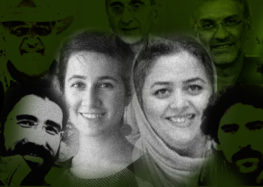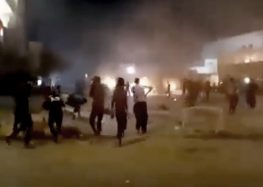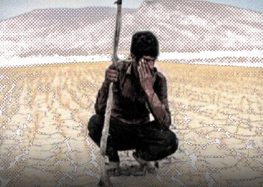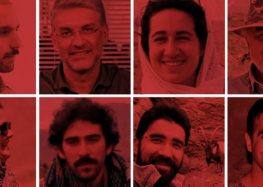Dozens of Environmentalists Arrested in Southern Iran in Widening Crackdown
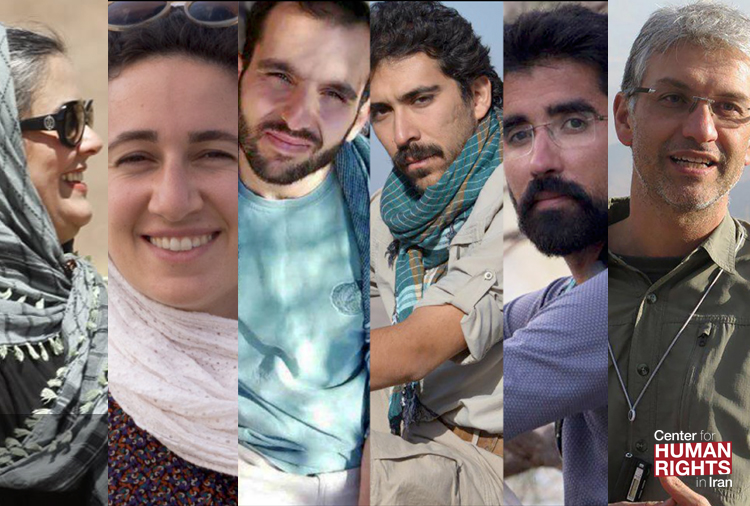 MP: Intelligence Ministry Has Rejected Espionage Claims
MP: Intelligence Ministry Has Rejected Espionage Claims
More than 40 environmentalists, rangers and some of their relatives were arrested May 7-8, 2018, in the southern Iranian harbor city of Bandar Lengeh and surrounding towns Lavaredin, Janah and Bastak in Hormozgan Province, the Center for Human Rights in Iran (CHRI) has learned.
Officials have not announced any reason for the arrests but many of the detainees were working on a regional wildlife project that was sponsored by the Persian Heritage Wildlife Foundation (PHWF), a non-governmental charitable organization that has been the target of a recent crackdown on environmentalists by the Islamic Revolutionary Guard Corps (IRGC).
“Most of the detainees are local individuals and activists,” a source close to the detainees told CHRI. “They have arrested almost everyone associated with the Laristan ram and wild sheep protection project.”
“This was one of the PHWF’s projects,” added the source on the condition of anonymity due to the sensitivities in Iran regarding speaking to foreign media outlets. “Of course, some of the relatives of the detained members of the Lavaredin Nature Conservation Institute were also arrested.
Before the latest arrests, more than a dozen Iranian environmentalists had been detained by the IRGC between January and February 2018. But a reformist member of Parliament (MP) stated that Iran’s Intelligence Minister Mahmoud Alavi has rejected claims by a high-ranking judicial official that the environmentalists had engaged in espionage.
“In yesterday’s meeting of the parliamentary committee on national security and foreign affairs, in response to questions to the intelligence minister about the reasons for the crackdown on environmental activists, the Intelligence Ministry’s counter-intelligence experts responded that they had found no evidence at all of ties to espionage,” said MP Mahmoud Sadeghi in a tweet on May 9.
One of the detainees, Taher Ghadirian, a young scientist associated with UNESCO’s Man and the Biosphere Program, was working as an environmental specialist for the Laristan project when he was arrested months earlier on January 25.
Since then, he has only had one visit from his mother that lasted a minute, the source said.
In a May 9 Instagram post that was deleted a few hours later, Iranian environmental activist Azar Sedaghati wrote that the homes of dozens of detained environmentalists and some of their relatives in southern Iran had been searched and that their communication devices had been confiscated.
According to CHRI’s source, the latest arrests were carried out by the IRGC.
“Some of the detainees had no connection with the PHWF and its projects, for instance, Mr. Bagher Zare, the father of Aref and Mohammad Zare who were arrested on February 26,” said the source. “He wasn’t aware of anything and his sons had not contacted him since their arrest.”
“The exact number of detainees has not been announced and their families are afraid to talk to the media, especially since the arrest of Mohammad and Aref Zare’s father,” continued the source. “As far as we know, Mr. Keshavarz, as well as Ali and Mohammad Hassannejad and Hamid Ghasourian are among the environmentalists detained in the past two days, along with Mr. Bagher Zare.”
“The IRGC’s Intelligence Organization’s agents who raided these people’s homes took away everyone’s laptops, computer hard drives and mobile phones as well as identification papers, books and handwritten notes,” the source added.
Mirhessam Khaleghi, the brother of environmentalist Ami-Hossein Khaleghi who was arrested earlier this year, tweeted on May 9, “In the past two days, about 40 local individuals and two rangers in Bandar Lengeh and surrounding villages were arrested and their communication devices were taken away, even those belonging to people who were not detained.”
The following people, who worked on the Laristan wildlife project on lands between Bandar Lengeh and Bastak, were arrested on February 26: Alireza Farhadzadeh, a photographer and nature documentary filmmaker; Morteza Arianejad, a nature conservation activist; Abdolreza Kouhpayeh, a nature photographer; Hassan Ragh, Aref and Hassan Zare (brothers).
Farhadzadeh had one family visit on April 6 but none of his detained colleagues in southern Iran have been allowed to contact their relatives.
In addition, Mohammad Saleh Ahmadi, an environmentalist based in the town of Janah, neat Bandar Lengeh, was arrested on April 29. The authorities have provided no information about his condition or where he is being held.
The IRGC’s crackdown on the environmentalists was condemned by UN officials after the PHWF’s Iranian Canadian managing director Kavous Seyed-Emami—who had been arrested in late January 2018 and taken to Evin Prison for interrogations—was suddenly pronounced dead to his family on February 9.
A top judicial official claimed he committed suicide and the judiciary has ignored calls by his family and UN officials for an independent investigation into Seyed-Emami’s death.
A so-called fact-finding commission set up by President Hassan Rouhani to investigate Seyed-Emami’s case and other suspicious deaths in detention has not publicized any findings nearly three months after its formation.

